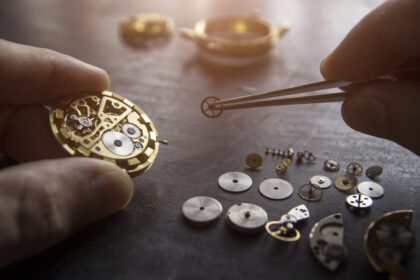Watch
We have come to expect a lot of our devices. I don’t often notice anyone wearing a simple timepiece. Instead, we have cell phones and fitness aids and wrist-worn gadgets that would have made a 1960s spy agency swoon.
But a mechanical watch used to be a simple thing. It had one function: to provide accurate time. That’s all an old school watch was expected to do, and if it did that one thing well, we could reasonably call it a good watch.
Except that a mechanical watch wasn’t a simple thing at all. Sure, it had a single function, but inside the watch is a mainspring, a whole series of gears, a balance wheel, a ticking device called an “escapement” to keep the watch’s hands moving at a consistent rate, and of course the hands themselves on a readable dial. If any of those individual pieces should be missing, the watch wouldn’t be able to perform its simple function of conveying accurate time.
A mechanical watch needs a lot more care than the quartz watch or radio watch most people have today. The oldest watches had to be provided energy by a human hand physically winding them. Mechanical watches have to be cleaned and calibrated occasionally. They need some care and maintenance.
As we consider the theme of liberating love this month—and really the entire array of values that we’re exploring as a possible revision to how we express Unitarian Universalism—I wonder if the mechanical watch offers any parallel for our consideration.
Maybe the values of Justice, Equity, Pluralism, Interdependence, Generosity, and Transformation are like the distinct pieces of a mechanical watch. Each of them play their own role, but their roles are inextricably connected to the other pieces. Which is to say, maybe we cannot fully understand or embody Equity if we don’t embrace Generosity. Rather than being individual goals or commitments, maybe these values describe a way of being that is complicated.
This would mean that they aren’t a checklist, even though we will always be able to look at our covenantal commitments and consider how we might live into them more fully. Our values aren’t things to be critiqued on a failure or success scale, because meaningful spiritual values will always offer us opportunities to grow and develop a deeper sense of integrity. We will never embody them perfectly, but we will probably always be able to identify ways we have allowed them to guide us.
If we were to name why those values are important, though… If we were to identify what those values combine to create, maybe the answer is liberating love. A mechanical watch’s purpose is to provide accurate time. Maybe our values serve the purpose of defining liberating love in the practical reality of our lives.
Could it be that the definition of liberating is a lived commitment to Justice, Transformation, Equity, Generosity, Pluralism, and Interdependence, all wrapped up in and around one another inseparably?
Share this post:
